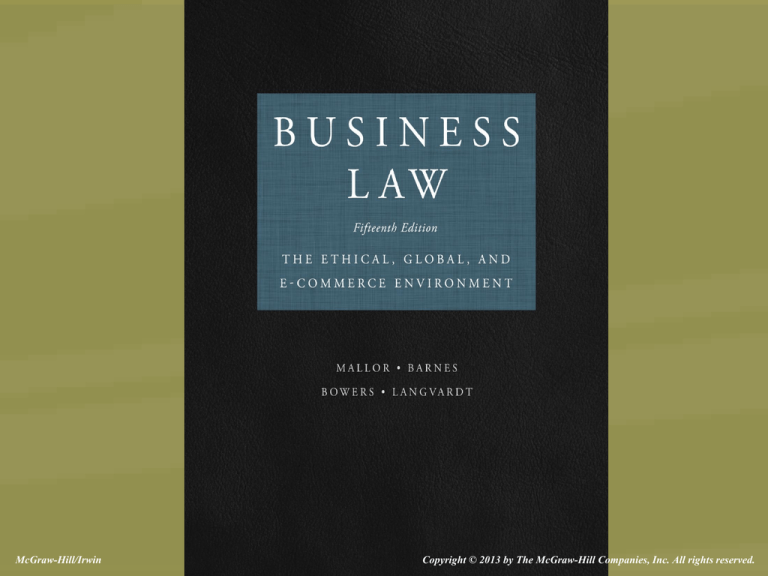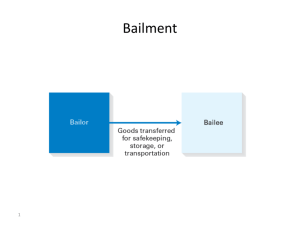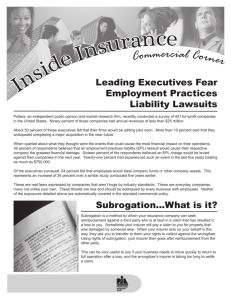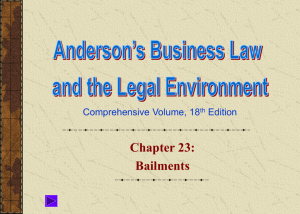
McGraw-Hill/Irwin
23-1
Copyright © 2013 by The McGraw-Hill Companies, Inc. All rights reserved.
P
A
R
T
Property
5
• Personal Property and Bailments
• Real Property
• Landlord and Tenant
• Estates and Trusts
• Insurance Law
23-2
C H A P
T
E R
23
Personal Property and
Bailments
Few rich men own their own
property. The property owns them.
Robert Green Ingersoll
In an address to the McKinley
League, New York City
(October 29, 1896)
23-3
Learning Objectives
• Understand concept of property
ownership as bundle of rights
recognized by law
• Differentiate types of property
• Explain bailments, including
creation, rights and duties
• Identify various documents of title
23-4
Property Overview
• Property refers to (a) something that
may be owned, or (b) a right or interest
that allows a person to exercise
dominion over a thing that may be
owned or possessed
• Property ownership is a bundle of rights
that the law recognizes and enforces,
including the rights to use, transfer, or
destroy the property
23-5
Classifying Property
• Property is classified as real or personal
• Personal property may be classified as:
– Tangible – has a physical existence
• Examples: cars, clothing, animals,
furniture
– Intangible -- has no physical existence
• Examples: intellectual property (patent,
copyright, trademark), stocks, and
bonds
23-6
Acquiring Ownership
• Ownership of personal property may be
acquired by:
–
–
–
–
–
–
–
–
Production
Purchase
Leasing
Gift
Will or inheritance
Confusion
Accession
Taking possession of unowned property
23-7
Possession of Unowned Property
• Two major examples of unowned property
that may be acquired by possession are
wild animals and abandoned property
• The first person to take possession of a wild
animal normally becomes the owner
– If a captured wild animal escapes and is
caught by another person, that person
becomes the owner unless s/he knew the
animal had escaped from the first person
23-8
Abandoned or Lost Property
• A person who finds abandoned, mislaid, or
lost property may – or may not – be the owner
• Property is considered abandoned if owner
intentionally placed property out of his/her
possession with intent to give up ownership
• Property is lost when the owner did not intend
to part with possession of the property
– Finder does not acquire ownership of property,
but acquires better rights to the lost property than
anyone other than the true owner
23-9
Mislaid Property
• A person who finds mislaid property
acquires no rights to the property, but has
the right to hold property for the true
owner and has better rights to the property
than anyone other than the true owner
– Property is mislaid when owner voluntarily
leaves the property, but forgets to retake
possession
– Finder must return the property when real
owner asks for the property
23-10
Estray Statutes and
Embedded Property
• Estray statutes allow finders of property to
clear their title to the property through
court action after giving public notice
• Embedded property refers to property
found underwater or in the ground
– Example: Corliss v. Wenner and Anderson
• Court: “We hold that the owner of the land has
constructive possession of all personal property
secreted in, on, or under his or her land.”
23-11
Leasing
• A lease of personal property is not a transfer
of ownership, but a transfer of the right to
possess and use personal property
belonging to another; common in business
settings
Example:
lease of
harvesting
combine
23-12
Inheritance & Gift
• Ownership of personal property may
transfer through inheritance upon the
death of the former owner
– Property passes by terms of a will or state
law
• A gift is a voluntary transfer of property to
the donee (the person who receives a gift),
for which the donor (the person who gives
the gift) gets no consideration in return
23-13
A Conditional Gift is Not a Gift
• If a person conditions a
gift by requiring that the
donee comply with
certain rules or perform
certain actions, the
conditional gift is not a
completed gift
– Example: Lindh v. Surman
about gift in contemplation
of marriage
23-14
Confusion & Accession
• Ownership of personal property may be
acquired by confusion, or the intermixing
of different owners’ goods in such a way
that they cannot later be separated
• Accession means increasing property
value by adding materials, labor, or both.
– In general, owner of original property is owner
of improvements, but person(s) adding value
may claim an ownership interest until paid
23-15
Bailments
• Bailment occurs when a bailor who owns
personal property (or someone holding the
right to possess it) delivers it to another (the
bailee) who accepts it and is under an express
or implied agreement to return it to the bailor
or someone designated by the bailor
Example:
bailment of car
to valet
23-16
Creation of a Bailment
Express or implied contract
Bailor
(owns or has right to
possess property)
Delivery of, exclusive
possession of, and
control over
property
Bailee
(knowingly accepts
property with
understanding that
s/he must return it)
Bailee has duty to return property
upon termination of bailment
23-17
Duties & Rights of The Bailee
• A bailee has two basic duties:
– To take care of the entrusted property
– To return property at the bailment’s
termination
• A bailee may have right to compensation
– Depends on the bailment agreement
• A person who finds lost or misplaced property
may be considered the involuntary bailee or
constructive bailee of the property
23-18
Bailee’s Duty of Care
• Degree of care required of bailee to
protect the property depends on the
type of bailment
1. Bailment for the benefit of the bailor
• Only minimal, or slight, degree of care
2. Bailment for mutual benefit
• Ordinary or reasonable care
3. Bailment for the benefit of the bailee
• High degree of care
23-19
Bailee’s Duty of Care
• Professional bailees, such as innkeepers
and common carriers, are held to a higher
duty of care than the ordinary bailee
• Bailees may try to limit or relieve
themselves of liability for bailed property
– Attempt by bailee to avoid liability for
intentional wrongful acts is against public
policy and will not be enforced
23-20
If Bailee Fails to Satisfy Duty
• A bailee is obligated to return property to
the bailor in the same or similar condition as
when bailed, subject to the degree of care
• Thus, if a bailee with an
ordinary or high duty of care
damages or fails to return the
property, bailee may be
liable to the bailor for
compensation or conversion
23-21
Special Bailments
• Some types of bailees are held to a higher
level of responsibility than normally required
by bailees, making these bailees almost an
insurer of the bailed goods
– Common carriers
– Innkeepers
– Safe-deposit boxes
• Document of title refers to the document that
identifies ownership of property
23-22
Negotiability
• The warehouse receipt or the bill of lading
may be either negotiable or non-negotiable
– A person who acquires a negotiable
document of title generally acquires both
title to the document and title to the goods
• To be negotiable, a warehouse receipt, bill
of lading, or other document of title must
provide that the goods are to be delivered
to the bearer or to the order of a named
person
23-23
Thought Questions
• Have you ever been a bailee? A
bailor? What type of problems may
arise in a bailment situation?
23-24




